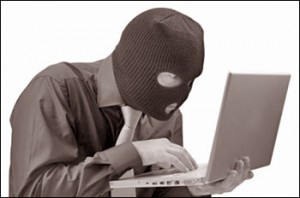Although number skills don’t come easily, I do scroll through my online account records every so often to piece together the week’s banking activity. I want to be sure I’m the one behind all the debits, and though I never expect to find anyone else there, this morning I did.
Last Friday there was a charge of $29.95 I didn’t recognize. It went through my account as a check with an unfamiliar number, and when I brought up its picture, it looked quite official. I wondered if maybe I’d made an online purchase that had just slipped my mind.
But try as I might, none of my receipts matched, and nothing I’d written down identified the sale. So today I went to the bank, armed with a print-out and an argument. As it turned out, I had to wait in line. Apparently a whole crowd of people in the area had experienced the identical scenario, some of whom had already visited the police station before landing at the bank.
When it came my turn to sit across a desk from an account manager, she began with suggestions of how to secure my checking account. An hour later, my bottom line was to close one account, open another, change passwords, put a stop on my debit card, order a new one, and use a credit-not-debit card hereafter for online buying.
Ugh.
As I looked across at the bank lady, waffling about what I should do, she described how her bank is working overtime to stay one step ahead of cyber-thieves. But banks are on the short list of “most likely targets” for cyber-attackers, and amateur hackers are the greatest threat by far.
In other words, the thief who took my $29.95 might very well have been a teenager working from his bedroom. As the banker said, “Snatching $30 from 10 people in a just a few minutes is pretty good money for very little work.”
So how are we to sleep at night? The answer has to found in something other than dollars, since those can never be 100% secure. But when you get right down to it, nothing on this earth is guaranteed safe from attack, not anything we own or anything we do. An enemy can even invade our bodies, which includes our minds and our person-hood: reputation, character, even our personalities.
There’s only one existing safe zone: our souls. God’s promise of soul-protection is more secure than even The Federal Reserve Bank’s underground stash of bullion. Once a soul is committed to his keeping, no known (or unknown) force has access, and that’s a glorious thing, since our souls live on eternally.
I’ll take soul-safety over dollar-safety any day.
“We who have fled to [God] for refuge can have great confidence as we hold to the hope that lies before us. This hope is a strong and trustworthy anchor for our souls.” (Hebrews 6:18-19)

